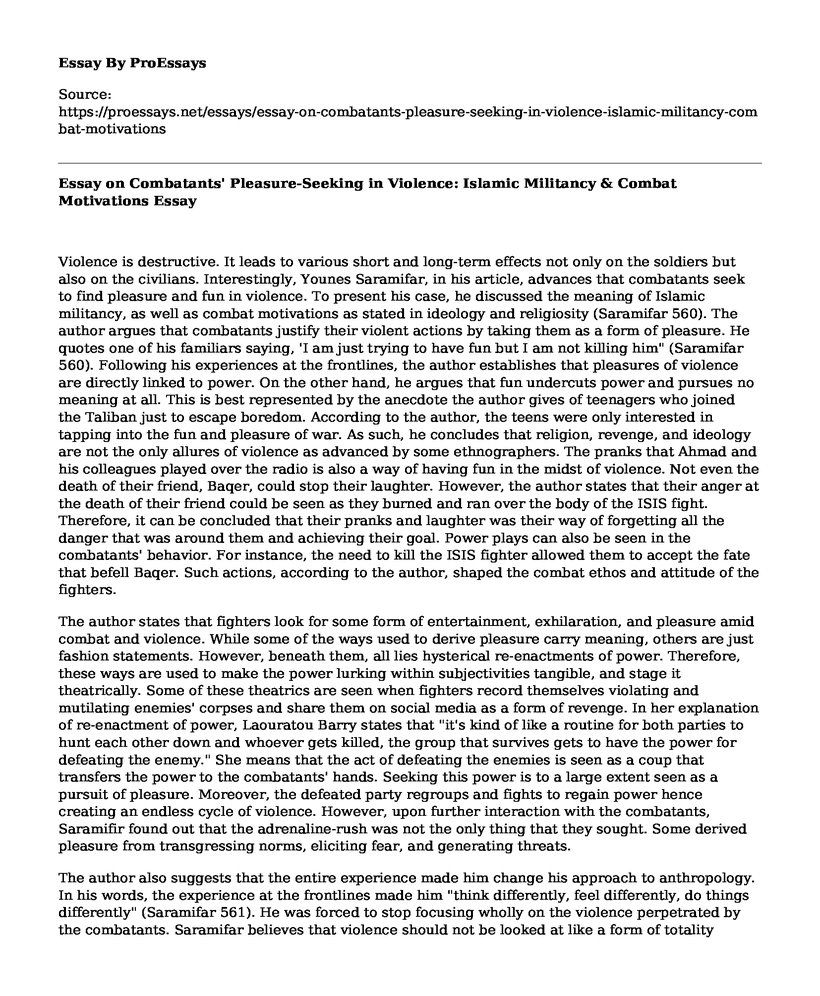Violence is destructive. It leads to various short and long-term effects not only on the soldiers but also on the civilians. Interestingly, Younes Saramifar, in his article, advances that combatants seek to find pleasure and fun in violence. To present his case, he discussed the meaning of Islamic militancy, as well as combat motivations as stated in ideology and religiosity (Saramifar 560). The author argues that combatants justify their violent actions by taking them as a form of pleasure. He quotes one of his familiars saying, 'I am just trying to have fun but I am not killing him" (Saramifar 560). Following his experiences at the frontlines, the author establishes that pleasures of violence are directly linked to power. On the other hand, he argues that fun undercuts power and pursues no meaning at all. This is best represented by the anecdote the author gives of teenagers who joined the Taliban just to escape boredom. According to the author, the teens were only interested in tapping into the fun and pleasure of war. As such, he concludes that religion, revenge, and ideology are not the only allures of violence as advanced by some ethnographers. The pranks that Ahmad and his colleagues played over the radio is also a way of having fun in the midst of violence. Not even the death of their friend, Baqer, could stop their laughter. However, the author states that their anger at the death of their friend could be seen as they burned and ran over the body of the ISIS fight. Therefore, it can be concluded that their pranks and laughter was their way of forgetting all the danger that was around them and achieving their goal. Power plays can also be seen in the combatants' behavior. For instance, the need to kill the ISIS fighter allowed them to accept the fate that befell Baqer. Such actions, according to the author, shaped the combat ethos and attitude of the fighters.
The author states that fighters look for some form of entertainment, exhilaration, and pleasure amid combat and violence. While some of the ways used to derive pleasure carry meaning, others are just fashion statements. However, beneath them, all lies hysterical re-enactments of power. Therefore, these ways are used to make the power lurking within subjectivities tangible, and stage it theatrically. Some of these theatrics are seen when fighters record themselves violating and mutilating enemies' corpses and share them on social media as a form of revenge. In her explanation of re-enactment of power, Laouratou Barry states that "it's kind of like a routine for both parties to hunt each other down and whoever gets killed, the group that survives gets to have the power for defeating the enemy." She means that the act of defeating the enemies is seen as a coup that transfers the power to the combatants' hands. Seeking this power is to a large extent seen as a pursuit of pleasure. Moreover, the defeated party regroups and fights to regain power hence creating an endless cycle of violence. However, upon further interaction with the combatants, Saramifir found out that the adrenaline-rush was not the only thing that they sought. Some derived pleasure from transgressing norms, eliciting fear, and generating threats.
The author also suggests that the entire experience made him change his approach to anthropology. In his words, the experience at the frontlines made him "think differently, feel differently, do things differently" (Saramifar 561). He was forced to stop focusing wholly on the violence perpetrated by the combatants. Saramifar believes that violence should not be looked at like a form of totality manifested through the actions of the combatants. In his explanation of this stand, Isis Scott explains that "the violence that the soldiers have seen and have participated in can really change who they are and it can be traumatizing." He means that the horrors that combatants face on the battlefield every day transform them. Therefore, actions that seem brutal and violent to ordinary citizens, might just look normal to them. As such, it would be inaccurate to look at the violence as a form of totality. However, Scott's argument, though very much logical, contradicts the author's stand that combatants shape war, and not the vice-versa.
Traditionally, ethnographers have reduced combatants to fellowships of financially and religio-politically motivated individuals. However, the author established that though the combatants still held onto their religiosity, it played a very little role during the actual act of war. Therefore, the goal of the author in this study was to chart a new research path of containing and representing post-combat experiences that often drive the machinery of recruitment. According to him, pursuing this path helps demystify the combat zone. He further states that anthropologists should study people in combat more to find the real meaning of fun and pleasures of violence. The persistence and resilience of the combatants should also be studied to help understand the pain and heat, as well as the fun and pleasure associated with violence.
Works Cited
Saramifar, Younes. "Tales of pleasures of violence and combat resilience among Iraqi Shi'i combatants fighting ISIS." Ethnography 20.4 (2019): 560-576.
Cite this page
Essay on Combatants' Pleasure-Seeking in Violence: Islamic Militancy & Combat Motivations. (2023, Apr 05). Retrieved from https://proessays.net/essays/essay-on-combatants-pleasure-seeking-in-violence-islamic-militancy-combat-motivations
If you are the original author of this essay and no longer wish to have it published on the ProEssays website, please click below to request its removal:
- Immigration and Adaptation - Essay Example
- Gender Roles and Gender Inequality Essay
- After a School Shooting are Parents to Blame? Essay Example
- Impacts of Racism Essay Example
- Essay Example on Drug Injection in Public Washrooms: A Sanitary Problem
- Essay Sample on Codependency in Addiction: A Case Study of Coleen
- Moral Issues of War Police and Terrorism in America - Free Paper Example







